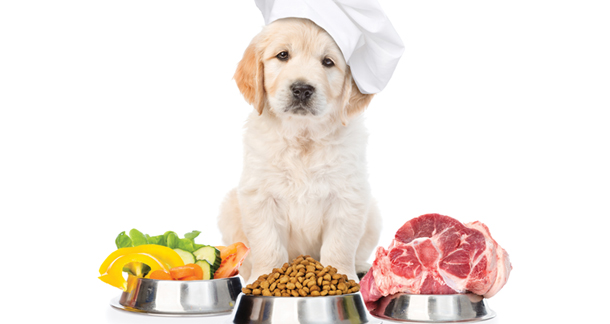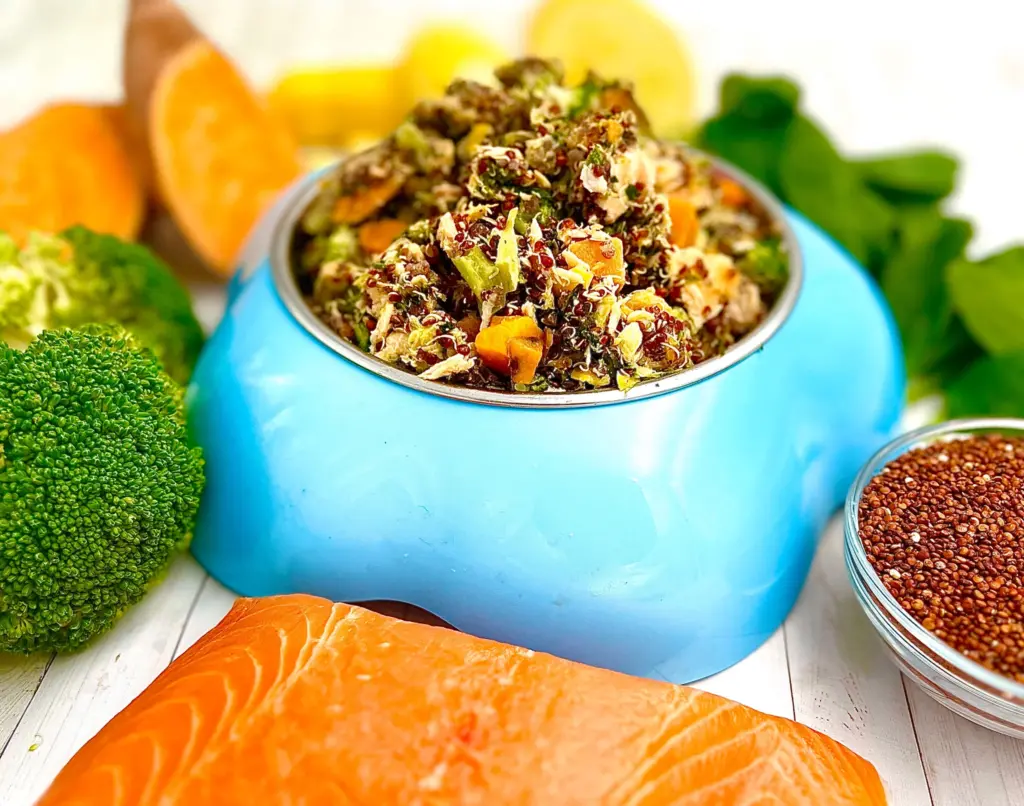
Kidney disease in dogs is a common condition that affects the functioning of the kidneys, leading to a gradual decline in their ability to filter waste products from the blood. It can result in a range of symptoms, such as increased thirst, frequent urination, weight loss, and lethargy. As a responsible pet owner, it is essential to understand the impact of kidney disease on our furry friends. In this article, we’ll discuss 3 vet-approved homemade dog food recipes for kidney disease. We’ll also discuss the benefits of homemade dog food recipes, nutritional considerations, and the additional supplements and ingredients we can add to these recipes.
Importance of a Balanced Diet for Dogs with Kidney Disease
A balanced diet can help manage the symptoms and slow the progression of kidney disease. When the kidneys are compromised, they struggle to eliminate waste products from the body. Hence, it becomes crucial to provide a diet low in phosphorus and sodium. Additionally, a diet rich in high-quality protein and antioxidants can support your dog’s overall health and provide them with the necessary nutrients they need to thrive along with kidney disease.

Benefits of Homemade Dog Food for Kidney Disease
Homemade dog food has gained popularity among pet owners, and it can be particularly beneficial for dogs with kidney disease.
Ingredients Control – One of the primary advantages of preparing your dog’s food at home is the ability to control the quality of ingredients. Commercial dog foods often contain fillers, preservatives, and additives that may not be in the best interest of your dog’s health with kidney disease. You can add ingredients that such dogs can tolerate.
Customization – By preparing your dog’s meals at home, you have full control over the ingredients that go into their food. It means you can carefully select ingredients that are low in phosphorus and sodium while still providing the necessary nutrients. You can also carefully balance proteins, fats, carbohydrates, and other nutrients.
Avoiding Allergens – Homemade dog meals allow you to avoid artificial additives and preservatives present in commercial dog food, which can be detrimental to your dog’s health. Homemade dog food allows you to eliminate potential allergens and customize the diet to address specific dietary sensitivities.
Also Read: 10 Eco-Friendly Pet Products to Keep Your Furry Friend Happy and the Planet Healthy
Dietary Guidelines for Dogs with Chronic Kidney Disease (CKD)
Following are the guidelines for dietary guidelines for dogs with chronic kidney disease:
| Nutrients (G/KCAL) | Therapeutic CKD Diets | AAFCO | NRC Recommended Allowance For Adult Dogs |
| Proteins | 31-41 | 45 | 25 |
| Fats | 40-62 | 14 | 14 |
| Phosphorous | 0.5-0.8 | 1.0 | 0.75 |
| Potassium | 1.1-2.3 | 1.5 | 1.0 |
| Sodium | 0.4-1.2 | 0.2 | 0.2 |
| EPA+DHA | 0.4-1.2 | n/a | 0.1 |
AAFCO – American Association of Feed Control Officials NRC – National Research Council
DHA – Docosahexaenoic acid EPA – Eicosapentaenoic Acid
Vet-Approved Homemade Dog Food Recipes for Kidney Disease
Three of the best vet-approved homemade dog food recipes for kidney disease are given below:

1. Chicken and Sweet Potato Delight
Ingredients:
- 1 cup cooked chicken (skinless, boneless)
- 1/2 cup sweet potato (cooked and mashed)
- 1/4 cup green beans (steamed and chopped)
Instructions:
- Combine the cooked chicken, mashed sweet potato, and chopped green beans in a mixing bowl.
- Mix well until all the ingredients are evenly distributed.
- Serve the mixture to your dog in appropriate meal-size portions.
2. Salmon and Quinoa Medley
Ingredients:
- 1 cup cooked salmon (flaked)
- 1/2 cup cooked quinoa
- 1/4 cup carrots (cooked and finely chopped)
Instructions:
- Combine the cooked salmon, cooked quinoa, and finely chopped carrots in a mixing bowl.
- Stir well to ensure all the ingredients are thoroughly mixed.
- Serve the mixture to your dog, adjusting the portion size based on their weight and nutritional needs.
3. Beef and Brown Rice Surprise
Ingredients:
- 1 cup cooked beef (lean and minced)
- 1/2 cup cooked brown rice
- 1/4 cup peas (steamed and mashed)
Instructions:
- Combine the cooked beef, cooked brown rice, and mashed peas in a mixing bowl.
- Mix well until all the ingredients are evenly incorporated.
- Serve the mixture to your dog, ensuring you provide the appropriate portion size for their specific dietary requirements.
Nutritional Considerations for Homemade Dog Food for Kidney Disease
When preparing homemade dog food for kidney disease, it is essential to consider the nutritional needs of your canine companion. Some of the important considerations include:
- Your dog’s diet should be low in phosphorus and sodium, as these can further strain the kidneys.
- Incorporating ingredients rich in antioxidants, such as blueberries or spinach, can also help combat oxidative stress and support overall well-being.
- Additionally, it is crucial to provide a moderate amount of high-quality protein to support muscle health.
Tips for Preparing and Storing Homemade Dog Food for Kidney Disease
Preparing and storing homemade dog food for kidney disease requires paying attention to details to ensure the safety and quality of the meals. Following are some essential tips you must keep in mind:
Food Preparation – Wash your hands thoroughly before handling any ingredients. Cook the food thoroughly to eliminate any potential pathogens. Avoid using toxic ingredients, such as onions, garlic, or chocolate, or those prohibited for dogs with kidney disease.
Portion Control – Divide the prepared food into individual meal-sized portions and refrigerate or freeze them. It makes it easier to defrost and serve the appropriate amount of food each time.
Storage – Store the prepared dog food in airtight containers to maintain freshness. Label each container with the date of preparation to ensure you use the oldest meals first. Follow proper storage guidelines to prevent spoilage and bacterial growth in those containers.
Additional Supplements and Ingredients for Dogs with Kidney Disease
In addition to a balanced homemade diet, you can add certain supplements and ingredients to these meals. These can provide added support for dogs with kidney disease. Consult your veterinarian before incorporating any of these into your dog’s diet:
B vitamins – These are essential for maintaining overall health and can support kidney function. Brewer’s yeast is a natural source of B vitamins.
Probiotics – These are live microorganisms that are intended to have health benefits when consumed or applied to the body. Probiotics can help promote a healthy gut microbiome and aid digestion. Yogurt or probiotic supplements formulated for dogs can be beneficial.
Omega-3 fatty acids – These can help reduce inflammation and support kidney function. Fish oil or flaxseed oil are common sources of omega-3 fatty acids.
Feeding Guidelines for Dogs with Kidney Disease
Feeding guidelines for dogs with kidney disease can vary depending on the severity of the condition and your dog’s specific needs. These may include:
- It is crucial to consult your veterinarian for personalized advice.
- Dogs with kidney disease may require smaller, more frequent meals to reduce the strain on their kidneys.
- Get guidance on portion sizes, frequency of feeding, and any necessary adjustments to the diet based on your dog’s individual needs.
Final Thoughts
Caring for a dog with kidney disease requires a holistic approach. Providing a balanced diet is a crucial aspect of your dog’s care. With vet-approved recipes, homemade dog food for kidney disease can offer numerous benefits. It allows you to control the ingredients and tailor the diet to your dog’s specific needs. Consult your veterinarian for guidance and closely monitor your dog’s progress. By nourishing your furry friend from the inside out, you can help improve their quality of life and support their overall health.

